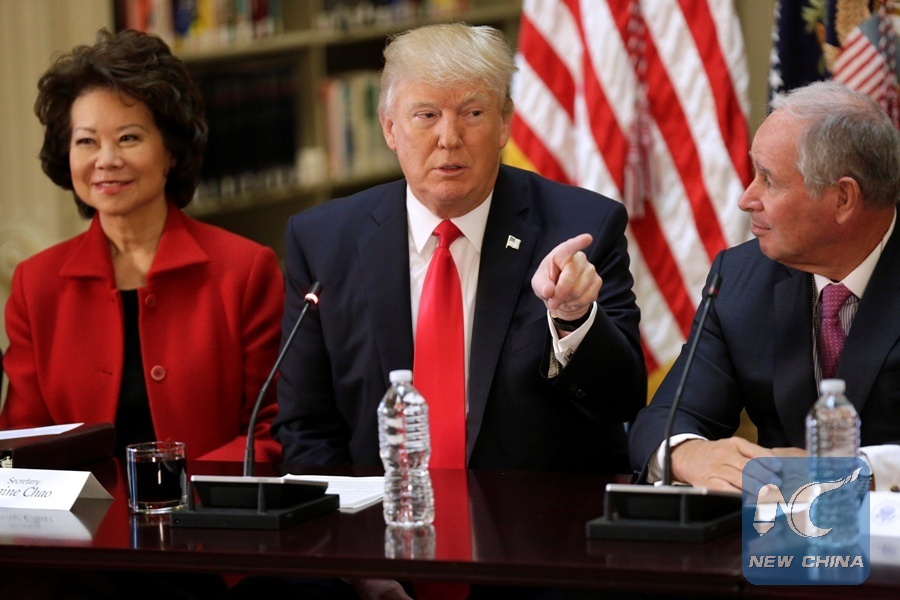WASHINGTON, April 11 (Xinhua) -- U.S. President Donald Trump is pushing for a massive infrastructure revamp to create more jobs, but it could increase U.S. debt and inflationary pressure as well, experts said.

U.S. President Donald Trump speaks during a strategic and policy CEO discussion as Secretary of Transportation Elaine Chao and CEO of Blackstone Stephen Schwarzman listen in the Eisenhower Execution Office Building in Washington, the United States, April 11, 2017. (Xinhua/REUTERS)
Trump laid out earlier this month the case for a massive spending bill to improve and renew U.S. infrastructure, which is outdated in some areas of the nation.
Trump's supporters elected him on his promises that he would revitalize the still sluggish U.S. economy through his proposed "great rebuilding" project.
While the official U.S. jobless rate is low, but the figure calculates only those who are actively looking for full-time work. In fact, millions of Americans -- especially in rural areas -- have given up the job search due to their dim prospects.
Desmond Lachman, a resident fellow at the American Enterprise Institute, told Xinhua that the plan will boost employment, especially in the construction sector, and will bring back into the work force at least some workers who are discouraged from seeking work.
"That's the good news. But the bad news is that Trump's massive building project is also likely to add to inflationary pressures on the labor market," Lachman added.
Moreover, Trump's plan could add to the already huge U.S. debt. And because of that, the plan should not be viewed in isolation. Rather, it should be seen together with the large unfunded tax cuts that Trump is proposing and with the proposed increases in defense spending, Lachman said.
This is almost certainly going to cause the U.S. budget deficit to widen, especially if Trump's optimistic assumptions about faster economic growth do not materialize, Lachman said.
"All of this could be damaging for both the U.S. and the global economies, since it is bound to force the Fed to raise interest rates at a faster rate in order to contain inflation. That in turn is likely to lead to further dollar strength, which will damage the U.S. trade position," he said.
"There can be no doubt that the U.S. economy could benefit from increased infrastructure spending. However, for such spending to be effective it needs to be properly financed with increased tax revenues," Lachman said.
But other experts do not believe Trump's rebuilding plan will have the desired impact.
Barry Bosworth, an economist at the Brookings Institution, told Xinhua that there is no fiscal space for a large stimulus program, adding that he believes the time for fiscal policy has passed.
U.S. media has been hard on Trump on a number of issues, but there are some positive signs, such as a stock market uptick on investor hopes that Trump will cut burdensome regulation that hampered the economy under former President Back Obama.
Diane Swonk, a veteran economist who is now independent, said that stock market investors have high hopes for the U.S. economy, and are encouraged not only by Trump's infrastructure promises, but also have hopes for cutting bureaucratic red tape and cutting taxes.
"We have yet to see meat on the bones beyond executive orders... The key will be for it to be realized," she told Xinhua.
The good news is that the U.S. economy is getting better, though many investors have not considered possible effects of higher inflation and interest rates, she said.















